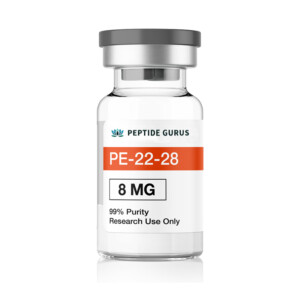Neurodegenerative diseases, such as Alzheimer’s, Parkinson’s, and Huntington’s disease, represent a significant burden on healthcare systems worldwide. These conditions are characterized by the progressive degeneration of neurons, leading to cognitive decline, motor dysfunction, and ultimately, loss of independence. The search for effective treatments is ongoing, and one promising avenue is the use of peptides like PE-22-28. This peptide has shown potential in treating neurodegenerative diseases by promoting neuronal survival and reducing inflammation. Understanding the mechanisms behind PE-22-28’s effects could pave the way for new therapeutic strategies.
Peptides are short chains of amino acids that play crucial roles in various biological processes. In recent years, research has focused on their potential therapeutic applications, particularly in neurodegenerative diseases. PE-22-28, a synthetic peptide, has garnered attention for its neuroprotective properties. It is believed to modulate cellular pathways involved in inflammation and apoptosis, which are key contributors to neuronal damage in conditions like Alzheimer’s disease. By targeting these pathways, PE-22-28 may help to preserve neuronal function and slow disease progression.
The development of PE-22-28 as a therapeutic agent aligns with the FDA’s latest guidelines on peptide-based treatments. These guidelines emphasize the importance of rigorous testing and quality control to ensure the safety and efficacy of peptide products. PeptideGurus, a leader in the field, adheres to these guidelines by partnering with WHO/GMP and ISO 9001:2008 certified manufacturers. This commitment to quality ensures that PE-22-28 and other peptides meet the highest standards, providing researchers with reliable tools for their studies.
Research into the potential of PE-22-28 in treating neurodegenerative diseases is still in its early stages, but initial findings are promising. Studies have shown that PE-22-28 can enhance synaptic plasticity, a critical factor in maintaining cognitive function. This effect is particularly important in Alzheimer’s disease, where synaptic loss correlates with cognitive decline. By improving synaptic function, PE-22-28 may help to preserve memory and learning abilities in affected individuals.
Inflammation is a hallmark of many neurodegenerative diseases, contributing to neuronal damage and disease progression. PE-22-28 has been shown to possess anti-inflammatory properties, potentially reducing the inflammatory response in the brain. This effect could mitigate neuronal damage and improve outcomes for patients with conditions like Parkinson’s disease. Ongoing research aims to elucidate the precise mechanisms by which PE-22-28 exerts its anti-inflammatory effects, paving the way for targeted therapies.

Apoptosis, or programmed cell death, is another factor contributing to neuronal loss in neurodegenerative diseases. PE-22-28 has demonstrated the ability to inhibit apoptosis in neuronal cells, offering a protective effect against cell death. By preserving neuronal integrity, PE-22-28 could slow disease progression and improve quality of life for patients. Further studies are needed to confirm these effects and determine the optimal dosage and delivery methods for therapeutic use.
In addition to its neuroprotective properties, PE-22-28 may also have a role in enhancing neurogenesis, the process by which new neurons are formed in the brain. This capability is particularly relevant in diseases like Huntington’s, where neuronal loss is significant. By promoting neurogenesis, PE-22-28 could help to replenish lost neurons and restore function. This potential makes PE-22-28 a candidate for combination therapies that aim to address multiple aspects of neurodegeneration.
PeptideGurus offers a comprehensive portfolio of research peptides, including PE-22-28, to support scientific advancements in neurodegenerative disease research. Our partnerships with certified manufacturers ensure that our products are of the highest quality and purity. This dedication to excellence allows researchers to focus on their studies, confident in the reliability of their materials. Our commitment to customer satisfaction is reflected in our competitive pricing and responsive customer service.
The role of peptides in treating neurodegenerative diseases is a rapidly evolving field, with new discoveries being made regularly. As more is learned about the mechanisms of action of peptides like PE-22-28, their potential applications may expand. Researchers are exploring the use of PE-22-28 in combination with other therapeutic agents to enhance its efficacy and target multiple disease pathways. This approach could lead to more effective treatments and improved outcomes for patients.
PeptideGurus’ collaboration with JANOSHIK LAB ensures that our products undergo rigorous testing, including HPLC, GCMS, and LCMS analyses. These tests confirm the purity and potency of our peptides, providing researchers with the data they need to advance their studies. Our quality inspection process is a testament to our commitment to scientific excellence and integrity. By prioritizing quality, we support the development of innovative therapies for neurodegenerative diseases.
The potential of PE-22-28 in treating neurodegenerative diseases highlights the importance of continued research and collaboration within the scientific community. By working together, researchers, manufacturers, and providers like PeptideGurus can accelerate the development of new treatments and improve patient outcomes. Our shared goal is to reduce the burden of neurodegenerative diseases and enhance the quality of life for those affected.
As the understanding of neurodegenerative diseases and their underlying mechanisms advances, the role of peptides like PE-22-28 will become increasingly significant. These molecules offer a promising avenue for developing targeted therapies that address the specific needs of patients. By continuing to explore the potential of peptides, researchers can unlock new possibilities for treatment and prevention, ultimately transforming the landscape of neurodegenerative disease management.
PeptideGurus remains committed to supporting the scientific community by providing high-quality research peptides and production equipment. Our dedication to quality and customer satisfaction ensures that researchers have the resources they need to make groundbreaking discoveries. As we look to the future, we are excited to see how peptides like PE-22-28 will contribute to the development of innovative therapies for neurodegenerative diseases.
In conclusion, the PE-22-28 peptide represents a promising therapeutic option for neurodegenerative diseases. Its potential to modulate key cellular pathways involved in inflammation, apoptosis, and neurogenesis makes it a valuable tool for researchers. As more is learned about its effects, PE-22-28 could play a crucial role in developing new treatments that improve the lives of patients worldwide.
PeptideGurus is a leading supplier of American-made research peptides, offering top-quality products at competitive prices. With a focus on excellence and customer service, they ensure a secure and convenient ordering process with global shipping.
CONTACT